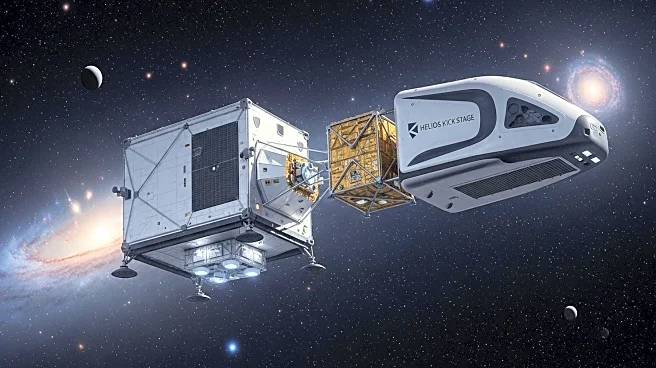What's Happening?
Impulse Space has announced a strategic plan to deliver up to 6 tons of payload to the lunar surface annually, starting with two missions in 2028. The company aims to address a gap in lunar cargo delivery capabilities for payloads ranging from 0.5 to 13 tons. This initiative will utilize a new lunar lander paired with the Helios high-energy kick stage, which will transport the lander to the moon's surface without requiring orbital refueling. The lander and kick stage will be launched on a standard rocket, with Helios facilitating the lander's journey to low lunar orbit within seven days. The lander will then separate and descend to the lunar surface. Impulse Space, founded by former SpaceX propulsion chief Tom Mueller, is leveraging its expertise in spacecraft engine development to ensure the lander's engine is throttleable and restartable, providing precise control in space.
Why It's Important?
This development is significant as it addresses a critical gap in lunar logistics, offering a solution for mid-sized payloads that are too large for NASA's Commercial Lunar Payload Services program and too small for human-rated landers from SpaceX and Blue Origin. By providing a cost-effective delivery option, Impulse Space could facilitate the transportation of essential equipment such as rovers, habitat modules, and power generators to the moon. This capability could accelerate lunar exploration and development, potentially benefiting scientific research and commercial ventures. The success of this initiative could also position Impulse Space as a key player in the burgeoning lunar economy, influencing future lunar missions and collaborations.
What's Next?
Impulse Space is already developing the Helios kick stage, with its first flight scheduled for late 2026. The company anticipates multiple flights per year by 2028. As the lunar lander engine is under development, Impulse Space is preparing to execute its plan based on industry demand and interest. If successful, this initiative could establish a new lunar delivery schedule, expanding opportunities for lunar exploration and commercial activities. Stakeholders in the space industry, including government agencies and private companies, may respond with increased interest in lunar missions, potentially leading to new partnerships and investments.
Beyond the Headlines
The implications of Impulse Space's plan extend beyond immediate logistical solutions. The development of reliable lunar delivery systems could pave the way for sustained lunar presence, supporting long-term scientific research and potential human settlement. Ethical considerations may arise regarding the environmental impact of increased lunar activity and the equitable distribution of lunar resources. Additionally, this initiative could influence international space policy, as countries and companies navigate the complexities of lunar exploration and resource utilization.









